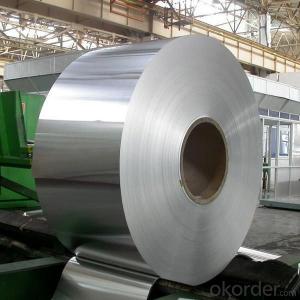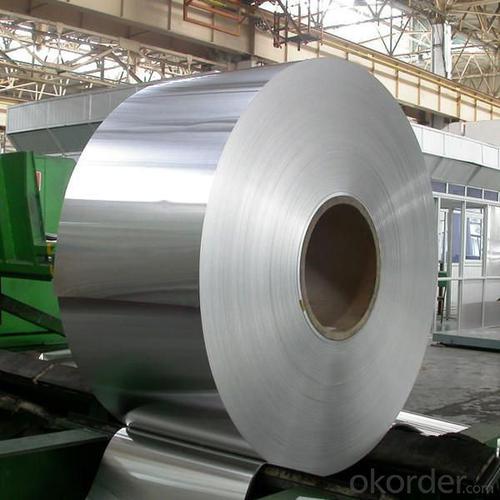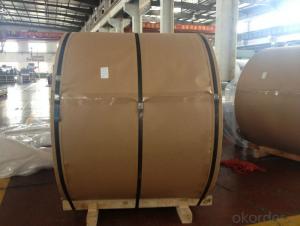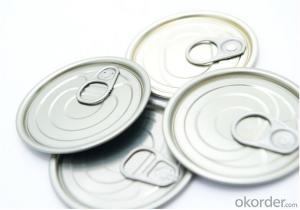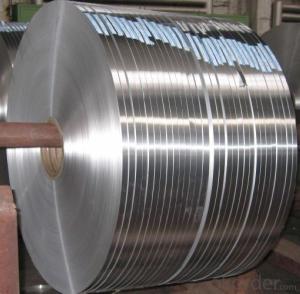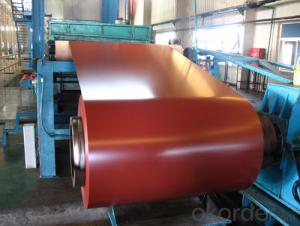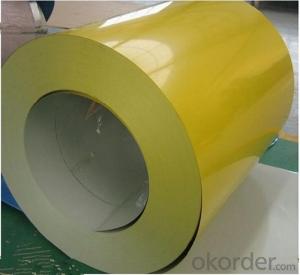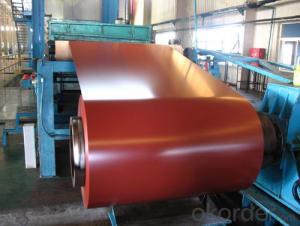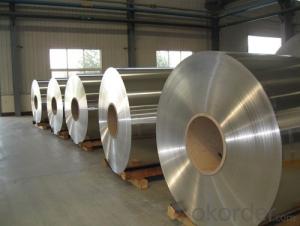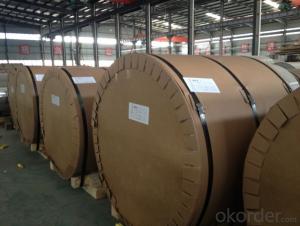Aluminum Steel Coils for Decoration Materials Production
- Loading Port:
- Shanghai
- Payment Terms:
- TT OR LC
- Min Order Qty:
- 5 m.t.
- Supply Capability:
- 60000 m.t./month
OKorder Service Pledge
OKorder Financial Service
You Might Also Like
Specification
Aluminium Coil For Decoration Materials Production
Alloy | 1050, 1060,1100, 3003 3004 3105 3A21 5005 5052 etc |
Temper | O/H12/H14/H1/H18/H32/H34/H36/H38//H111/H112/H116/H321/T6/T651/T3/T351 etc |
Thickness | 0.1mm to 6mm |
Width | 20mm to 3300mm |
Coil weight | 100kgs to 6 tons depends on actual requirement |
Core material | Aluminum or paper |
Coil inner diameter | 75mm, 150mm, 200mm, 300mm, 405mm, 505mm or as required |
Appplication | construction, roofing, decoration, lamping etc |
Package | eye to wall or eye to the wall for aluminum coil with wood pallet (wooded case also available) |
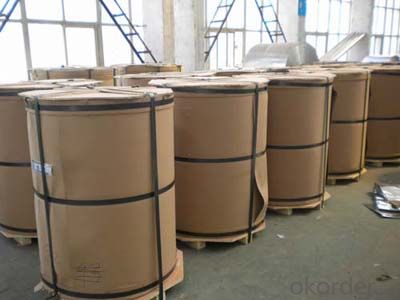
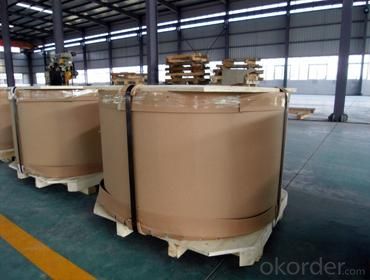
3) Glass curtain wall frame
4) Interior decoration
5) Elevator decoration
6) Signs, nameplate, bags making.
7) Automobile parts material
8) Office and Household appliances: HVAC equipments
9) The consumer electronics: mobile phones, digital cameras, MP3 .etc.
Coating varieties
Polyester Coatings (PE)
PE (polyester) coatings exhibit an excellent combination of hardness, flexibility, flow, appearance, and superior resistance to dirt retention in indoor and outdoor applications. These coatings are highly resistant to abrasion, metal marking, staining, and marring, and require minimal maintenance. Glazetech uses polyester paints which provide excellent colour and gloss retention properties.
Polyvinylidene Fluoride Coatings (PVDF)
PVDF (polyvinylidene fluoride) is a chemical resistant thick film barrier coating commonly used in architectural applications where both excellent appearance and substrate protection must be maintained over a long period of time. This coating is unaffected by most chemicals and solvents and has excellent wear and abrasion resistance. PVDF also has a high dielectric strength, excellent resistance to weathering and the ability to self extinguish.
FAQ
--Q: Do you provide free samples?
--A: Yes, free samples will be sent to you on freight at destination.
--Q: Can I get your latest products catalogue?
--A: Yes, it will be sent to you in no time.
--Q: What is the MOQ?
--A: 2 tons
--Q: What are your payment terms?
--A: We accept L/C, T/T.
--Q: What kinds of alloy can you supply?
--A: 1000 series: 1050, 1060, 1070, 1100, 1145, 1200
3000 series: 3003, 3004, 3105, 3104
5000 series: 5052, 5083, 5754, 5182
6000 series: 6061, 6063, 6062, 6063
8000 series: 8011, 8021
--Q: What’s the coating of top side?
--A: PVDF and PE coating
--Q: What kinds of temper can you supply?
--A: O-H112: O,H12,H14,H16,H18,H22,H24,H26,H,32,H34,H111,H112
T3, T4, T6
- Q: Is it possible to use an aluminum coil as a paperweight for holding down papers?
- <p>Yes, you can use an aluminum coil as a paperweight. Aluminum is a lightweight and sturdy metal that can effectively hold down papers on a desk. Its weight and shape make it suitable for this purpose. However, ensure the coil is clean and smooth to avoid any damage to the papers or surfaces it comes into contact with. Additionally, consider the size and thickness of the coil to ensure it provides enough weight to keep your papers in place.</p>
- Q: What are the different coil coating technologies used for aluminum coils?
- There are several different coil coating technologies used for aluminum coils, each offering distinct advantages and suitability for specific applications. 1. Coil Coating with Liquid Coatings: This traditional method involves the application of liquid coatings onto aluminum coils. The coatings can be solvent-based or water-based and are typically applied using roll coating or spray coating techniques. Liquid coatings offer a wide range of color options, excellent chemical resistance, and good adhesion to the substrate. However, they may require longer drying times and can result in uneven coating thicknesses. 2. Coil Coating with Powder Coatings: Powder coatings are electrostatically applied onto aluminum coils in a dry powder form. The coated coils are then heated to melt and cure the powder, forming a tough and durable finish. Powder coatings offer excellent corrosion resistance, UV resistance, and impact resistance. They also have a high deposition efficiency, resulting in minimal waste. However, powder coatings may have limited color options compared to liquid coatings. 3. Coil Coating with PVDF (Polyvinylidene Fluoride) Coatings: PVDF coatings are a type of liquid coating that offers exceptional weatherability and durability. These coatings are known for their excellent resistance to fading, chalking, and chemical exposure. PVDF coatings are commonly used in architectural applications where long-term performance and color retention are crucial. They can be applied using roll coating or spray coating methods. 4. Coil Coating with Polyester Coatings: Polyester coatings are widely used in various industries due to their cost-effectiveness and versatility. These coatings offer good color retention, flexibility, and resistance to abrasion. Polyester coatings are available in a wide range of colors and textures, making them suitable for decorative applications. They can be applied using both liquid and powder coating methods. 5. Coil Coating with Polyurethane Coatings: Polyurethane coatings provide excellent adhesion, flexibility, and impact resistance. These coatings are commonly used in demanding applications where durability and resistance to harsh environments are required. Polyurethane coatings offer good color retention and can be applied using liquid coating techniques. In summary, the different coil coating technologies used for aluminum coils include liquid coatings, powder coatings, PVDF coatings, polyester coatings, and polyurethane coatings. The choice of coating technology depends on factors such as the desired performance characteristics, application requirements, and cost considerations.
- Q: What are the potential applications of coil-painted aluminum coils?
- Coil-painted aluminum coils have a wide range of potential applications across various industries. The coil-painting process involves applying a layer of paint onto aluminum coils before they are shaped and formed into different products. This process enhances the durability and aesthetic appeal of the aluminum, making it suitable for a variety of uses. One potential application of coil-painted aluminum coils is in the construction industry. The coated aluminum can be used for roofing, siding, and façade systems. The paint adds an extra layer of protection against corrosion and weathering, ensuring the longevity of the building materials. Additionally, the wide range of colors and finishes available in coil-painted aluminum allows for customization and design flexibility in architectural projects. Another application is in the automotive industry. Coil-painted aluminum can be used for manufacturing car body panels, trim, and other exterior components. The paint provides a smooth and consistent finish, enhancing the aesthetics of the vehicle. Additionally, the lightweight nature of aluminum makes it an ideal material for improving fuel efficiency, and the coil-painting process further enhances its resistance to scratches and fading caused by UV rays. Coil-painted aluminum coils also find applications in the manufacturing of appliances, such as refrigerators, ovens, and air conditioning units. The painted surface not only enhances the appearance of the appliances but also protects them from corrosion and wear and tear. The coil-painted aluminum can be easily formed into different shapes and sizes, allowing for efficient production of various appliance components. Furthermore, coil-painted aluminum is commonly used in the signage industry. The vibrant colors and durable finish achieved through the coil-painting process make it an excellent choice for outdoor and indoor signage. The aluminum coils can be cut, shaped, and formed into different sign types, including channel letters, lightboxes, and dimensional signs. In summary, the potential applications of coil-painted aluminum coils are extensive. From construction and automotive industries to appliances and signage, the enhanced durability, aesthetic appeal, and customization options of coil-painted aluminum make it a versatile material for various manufacturing purposes.
- Q: What are the different coil handling options available for aluminum coils?
- Some of the different coil handling options available for aluminum coils include coil lifters, coil tongs, coil hooks, coil cradles, coil upenders, and coil cars. These options allow for safe and efficient handling of aluminum coils during transportation, storage, and processing.
- Q: Can aluminum coils be used in electrical busbars?
- Yes, aluminum coils can be used in electrical busbars. Aluminum offers good conductivity, is lightweight, and cost-effective, making it suitable for use in busbars. However, proper insulation and connection techniques must be employed to address the higher thermal expansion and potential corrosion issues associated with aluminum.
- Q: Can aluminum coils be used for electrical transformers?
- Yes, aluminum coils can be used for electrical transformers. Aluminum is a suitable material for transformer coils due to its high electrical conductivity and lower cost compared to copper. While copper has traditionally been the preferred choice for transformer windings, the use of aluminum has gained popularity in recent years due to its lighter weight and lower price. Aluminum coils are also advantageous in terms of thermal conductivity, as they dissipate heat more efficiently than copper. However, it is important to consider the specific requirements and design considerations of the transformer, as the choice between aluminum and copper coils may depend on factors such as voltage, current, size, and insulation requirements.
- Q: Are aluminum coils suitable for heat exchangers?
- Yes, aluminum coils are suitable for heat exchangers. Aluminum has excellent thermal conductivity, corrosion resistance, and lightweight properties, making it an ideal material for heat transfer applications. Aluminum coils can efficiently transfer heat between fluids in heat exchangers, making them a popular choice in various industries.
- Q: Are aluminum coils suitable for high-temperature applications?
- No, aluminum coils are not suitable for high-temperature applications as they have a low melting point and can deform or degrade at elevated temperatures.
- Q: What is the typical thickness tolerance for aluminum coils?
- The thickness tolerance for aluminum coils can vary based on specific requirements and industry standards. Generally, the tolerance falls within a range of +/- 0.002 to 0.005 inches. This means that the actual thickness of the aluminum coil can deviate from the specified thickness by a maximum of either 0.002 or 0.005 inches, depending on the tolerance requirements. It's worth noting that these tolerances can also be expressed as a percentage of the specified thickness, typically ranging from 4% to 8%. These tolerances ensure that the aluminum coil thickness aligns with desired specifications and allows for an acceptable level of variation for the intended application.
- Q: How do aluminum coils compare to copper coils in terms of conductivity?
- The conductivity properties of aluminum coils and copper coils differ. Copper is renowned for its exceptional electrical conductivity, making it the preferred option for applications where maximum efficiency is vital, like electrical wiring and motor windings. In comparison, copper coils possess a considerably higher electrical conductivity than aluminum coils. Consequently, copper coils can transmit electricity more efficiently, resulting in decreased power losses and enhanced overall performance. Conversely, aluminum coils exhibit lower electrical conductivity when compared to copper coils. Although aluminum is still a capable conductor of electricity, it is not as efficient as copper. This implies that aluminum coils may experience increased power losses and reduced efficiency in contrast to their copper counterparts. Nevertheless, aluminum coils possess their own advantages in certain applications, such as being lighter and more cost-effective. Ultimately, the choice between aluminum and copper coils hinges on the specific requirements of the application, with copper being favored for its superior conductivity properties.
Send your message to us
Aluminum Steel Coils for Decoration Materials Production
- Loading Port:
- Shanghai
- Payment Terms:
- TT OR LC
- Min Order Qty:
- 5 m.t.
- Supply Capability:
- 60000 m.t./month
OKorder Service Pledge
OKorder Financial Service
Similar products
Hot products
Hot Searches
Related keywords
